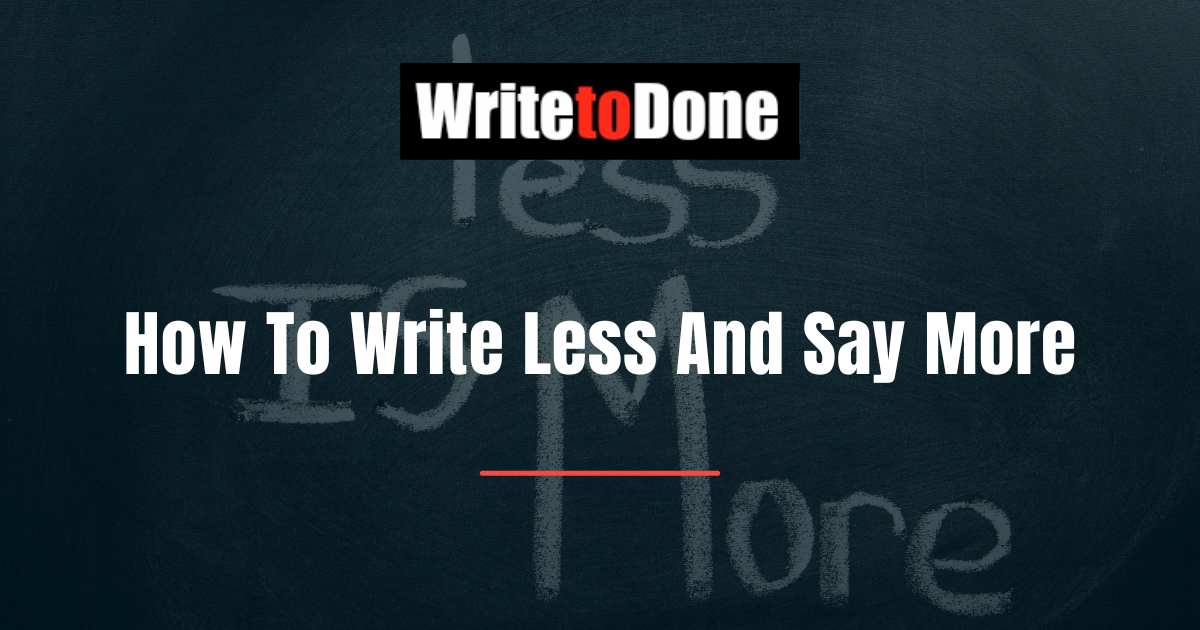“The happiness of too many days is often destroyed by trying to accomplish too much in one day. We would do well to follow a common rule for our daily lives – Do Less and Do It Better.” – Dale E. Turner
There’s a maxim in the Unix programming philosophy that says programmers should “write programs that do one thing and do it well.”
It’s a beautiful philosophy, and one that can be applied just as well to your writing.
I think sometimes we start writing with a fuzzy idea in our heads of what it is we want to write. For that reason, we might procrastinate on writing because we’re not sure what it is we want to accomplish — it’s just a vague, undoable goal (“gotta write my book today”) and that’s hard to wrap your head around.
At the same time, if we do actually tackle the writing, we might be extremely unfocused if we don’t have a clear writing goal for that day. Yet another potential problem is that we might try to tackle too much writing each day, and as a result what we write isn’t our best stuff, or just as bad, we don’t really get much done.
Write one thing today, and write it well. Here’s how.
- Simplifying your writing. Writing just one thing each day, if possible, will help you to focus your energies and write as well as you can. It keeps you from being overwhelmed, and helps you to remain at peace as you write.
- Create a clear goal. Instead of saying that you’re going to “work on this chapter” or “write that article” or “write a blog post”, it’s helpful to create a clear goal in your mind about what exactly it is you want to write. Be as clear as possible, and visualize it in your head. For example, instead of “writing that blog post”, close your eyes and either visualize how the blog post will be, section by section, or hear it in your head. Use this visualization to write down a very detailed and specific goal for your writing for the day.
- Set your goal the night before. It’s good to do the visualization the day before, so that you’re ready to go when you start your day. It gives you time to really think about what you want to write about, to even mull it over in your sleep. If you tend to come up with good ideas while you sleep, you might even want to keep a notebook by your bed so you can jot down ideas before they evaporate. It’s also great to start your day with your goal clearly in mind — it helps keep you focused on your purpose.
- Focus on something important. It’s not enough to just write one thing well if it’s something that doesn’t really make a difference. Sure, any writing is a good thing, but still, it’s better to use your writing time wisely if you can. So focus on writing something that will have a lasting impact: a high-profile magazine article, your first novel, a blog post that will draw a lot of attention and links. If you’re going to limit your writing, make it count.
- Block out time. If your life has more in it than just writing (and I think that applies to just about all of us), it’s important that you have a block in your schedule just for your writing. Whether that be first thing in the morning, sometime in the early afternoon, or late at night, it really doesn’t matter. Just make that block of time and don’t let the rest of your life violate that appointment.
- Pour all your energy into it. When you sit down to write, focusing on something important, with a clear goal in mind … it’s time to put all of your energy into it. Try to block out all distractions, to really put your mind into your writing, to get lost in what you’re doing. This will require at least 30 minutes of uninterrupted time — an hour is better, and two hours are even better than that. Once you’ve learned to pour yourself into your writing, without distractions, with complete focus … it’s a whole other level of writing. It’s wonderful.
- Be proud of the job you’ve done. If you’ve really focused on doing your writing task for the day, and doing it well, that’s something to be proud of. That’s an accomplishment. It’s something to celebrate! Be sure to bask in the wonder that is doing a job well — and remember this feeling, as it will help motivate you tomorrow.
- Take time to review this accomplishment. Think about all the steps you took today, when you’re done. What worked and what didn’t? What obstacles did you encounter and how can you learn from it so you’ll get better next time? Is there a better way to do this? What distractions do you need to get rid of? This mental review will help you become a better writer, and will help you master this skill of losing yourself in your writing and doing it well.
- Prepare for tomorrow. Once you’ve done your little review, start planning for the next day’s work. Again, visualize your writing and write down your goal. Tackle the next day with vigor and joy!
















